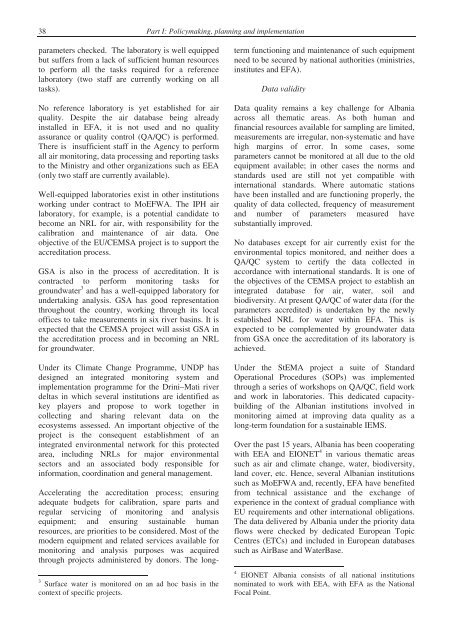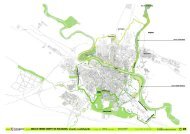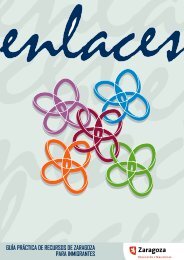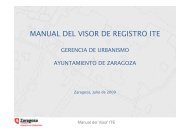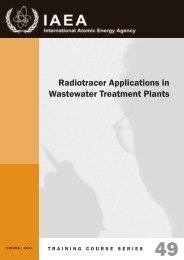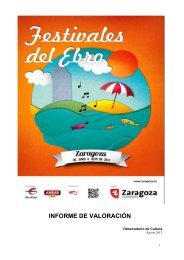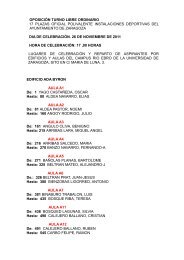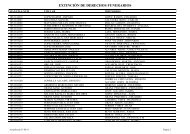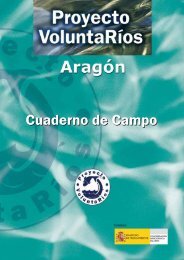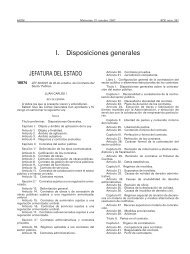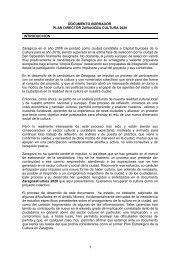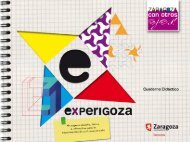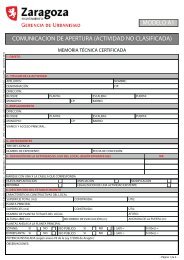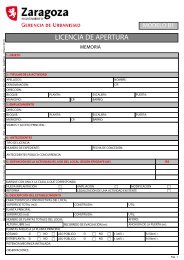Chapter 3: Information, public participation and education 37Photo 3.1: Laguna KaravastasaThe institutional structures created at regional level(12 REAs, and six river basin authorities) havepractically no monitoring capability (when assigned),their budgets and human resources being moresymbolic than operational. Furthermore, basic testingequipment for checking the situation in the field orfor taking samples is lacking. IPH operates at thelocal level through its regional network formonitoring both air quality and drinking water.Sampling is done manually and the frequency iswithin normal requirements, although with limitedparameters in comparison with the automaticstations.No clear cooperation links exist (in particular at thelocal level) between, for example, the REAs, thelocal health inspectorates, the food and agricultureinspectorate, GSA <strong>of</strong>fices, etc. for working together,sharing expertise and equipment or performing jointinspection tasks. On the contrary, their relationshipssometimes tend to become competitive.Self-monitoring by enterprises, although anticipatedin law, is hardly ever carried out. The REAs do nothave the necessary resources and equipment to checksuch activities and assess compliance.Since the regional environmental landscape ispopulated by several regional structures (belonging toMoEFWA, MoH, GSA, MoAFCP, etc.) with variousmonitoring abilities, a future partnership, formalisedby law (e.g. association, merger, agreement forcooperation), could be beneficial in order to enhanceboth human and equipment-related capabilities andincrease regional influence in relation to localenterprises, local authorities and other publicorganizations. Although associated within onestructure, environment and forestry activities arecurrently disconnected within the REAs. A jointwork plan (encompassing both environment andforestry), shared budgets and team cooperation onmonitoring and inspection tasks would counteract thecurrent lack <strong>of</strong> resources and increase the overallposition and role <strong>of</strong> each agency at the local level.Procedures, intercalibration andaccreditationThe 2011 Law on <strong>Environmental</strong> Protection makesspecific reference to the role <strong>of</strong> accreditedlaboratories in performing measurements and testsfollowing standardized procedures (article 53).Concrete steps in this direction have been made forwater issues; in fact, in May 2011, the EFA NationalReference Laboratory (NRL) became the firstaccredited laboratory for water, initially coveringseven parameters. Training is currently taking placefor staff in the laboratory to perform analysis <strong>of</strong>heavy metals, as part <strong>of</strong> a programme under theProgramme for the Assessment and Control <strong>of</strong>Pollution in the Mediterranean region (MED POL),with the prospect <strong>of</strong> increasing the number <strong>of</strong>
38 Part I: Policymaking, planning and implementationparameters checked. The laboratory is well equippedbut suffers from a lack <strong>of</strong> sufficient human resourcesto perform all the tasks required for a referencelaboratory (two staff are currently working on alltasks).No reference laboratory is yet established for airquality. Despite the air database being alreadyinstalled in EFA, it is not used and no qualityassurance or quality control (QA/QC) is performed.There is insufficient staff in the Agency to performall air monitoring, data processing and reporting tasksto the Ministry and other organizations such as EEA(only two staff are currently available).Well-equipped laboratories exist in other institutionsworking under contract to MoEFWA. The IPH airlaboratory, for example, is a potential candidate tobecome an NRL for air, with responsibility for thecalibration and maintenance <strong>of</strong> air data. Oneobjective <strong>of</strong> the EU/CEMSA project is to support theaccreditation process.GSA is also in the process <strong>of</strong> accreditation. It iscontracted to perform monitoring tasks forgroundwater 3 and has a well-equipped laboratory forundertaking analysis. GSA has good representationthroughout the country, working through its local<strong>of</strong>fices to take measurements in six river basins. It isexpected that the CEMSA project will assist GSA inthe accreditation process and in becoming an NRLfor groundwater.Under its Climate Change Programme, UNDP hasdesigned an integrated monitoring system andimplementation programme for the Drini–Mati riverdeltas in which several institutions are identified askey players and propose to work together incollecting and sharing relevant data on theecosystems assessed. An important objective <strong>of</strong> theproject is the consequent establishment <strong>of</strong> anintegrated environmental network for this protectedarea, including NRLs for major environmentalsectors and an associated body responsible forinformation, coordination and general management.Accelerating the accreditation process; ensuringadequate budgets for calibration, spare parts andregular servicing <strong>of</strong> monitoring and analysisequipment; and ensuring sustainable humanresources, are priorities to be considered. Most <strong>of</strong> themodern equipment and related services available formonitoring and analysis purposes was acquiredthrough projects administered by donors. The long3 Surface water is monitored on an ad hoc basis in thecontext <strong>of</strong> specific projects.term functioning and maintenance <strong>of</strong> such equipmentneed to be secured by national authorities (ministries,institutes and EFA).Data validityData quality remains a key challenge for <strong>Albania</strong>across all thematic areas. As both human andfinancial resources available for sampling are limited,measurements are irregular, non-systematic and havehigh margins <strong>of</strong> error. In some cases, someparameters cannot be monitored at all due to the oldequipment available; in other cases the norms andstandards used are still not yet compatible withinternational standards. Where automatic stationshave been installed and are functioning properly, thequality <strong>of</strong> data collected, frequency <strong>of</strong> measurementand number <strong>of</strong> parameters measured havesubstantially improved.No databases except for air currently exist for theenvironmental topics monitored, and neither does aQA/QC system to certify the data collected inaccordance with international standards. It is one <strong>of</strong>the objectives <strong>of</strong> the CEMSA project to establish anintegrated database for air, water, soil andbiodiversity. At present QA/QC <strong>of</strong> water data (for theparameters accredited) is undertaken by the newlyestablished NRL for water within EFA. This isexpected to be complemented by groundwater datafrom GSA once the accreditation <strong>of</strong> its laboratory isachieved.Under the StEMA project a suite <strong>of</strong> StandardOperational Procedures (SOPs) was implementedthrough a series <strong>of</strong> workshops on QA/QC, field workand work in laboratories. This dedicated capacitybuilding<strong>of</strong> the <strong>Albania</strong>n institutions involved inmonitoring aimed at improving data quality as along-term foundation for a sustainable IEMS.Over the past 15 years, <strong>Albania</strong> has been cooperatingwith EEA and EIONET 4 in various thematic areassuch as air and climate change, water, biodiversity,land cover, etc. Hence, several <strong>Albania</strong>n institutionssuch as MoEFWA and, recently, EFA have benefitedfrom technical assistance and the exchange <strong>of</strong>experience in the context <strong>of</strong> gradual compliance withEU requirements and other international obligations.The data delivered by <strong>Albania</strong> under the priority dataflows were checked by dedicated European TopicCentres (ETCs) and included in European databasessuch as AirBase and WaterBase.4 EIONET <strong>Albania</strong> consists <strong>of</strong> all national institutionsnominated to work with EEA, with EFA as the NationalFocal Point.
- Page 1 and 2:
UNITED NATIONS ECONOMIC COMMISSION
- Page 6 and 7:
vPrefaceThe second EPR of Albania b
- Page 8 and 9:
viiLIST OF TEAM MEMBERSMr. Antoine
- Page 10 and 11:
ixMinistry of Agriculture, Food and
- Page 12 and 13:
xiCONTENTSForeword ................
- Page 14 and 15:
8.3 Biological diversity ..........
- Page 16 and 17: xvPageChapter 8Table 8.1:Table 8.2:
- Page 18 and 19: xviiPageLIST OF PHOTOSIntroductionP
- Page 20 and 21: xixLIST OF ABBREVIATIONSAICASCICANP
- Page 22 and 23: xxiSIGNS AND MEASURES .. not availa
- Page 24 and 25: xxiiiExecutive summaryThe first Env
- Page 26 and 27: The entire education system is subj
- Page 28 and 29: was done by international consultan
- Page 30 and 31: 1Introduction I.1 Physical contextA
- Page 32 and 33: Introduction3The country has deposi
- Page 34 and 35: Introduction5Photo I.1: Ruins of Sk
- Page 36: PART I: POLICYMAKING, PLANNING AND
- Page 39 and 40: 10 Part I: Policymaking, planning a
- Page 41 and 42: 12 Part I: Policymaking, planning a
- Page 43 and 44: 14 Part I: Policymaking, planning a
- Page 45 and 46: 16 Part I: Policymaking, planning a
- Page 47 and 48: 18 Part I: Policymaking, planning a
- Page 49 and 50: 20 Part I: Policymaking, planning a
- Page 51 and 52: 22 Part I: Policymaking, planning a
- Page 53 and 54: 24 Part I: Policymaking, planning a
- Page 55 and 56: 26 Part I: Policymaking, planning a
- Page 57 and 58: 28 Part I: Policymaking, planning a
- Page 59 and 60: 30 Part I: Policymaking, planning a
- Page 61 and 62: 32 Part I: Policymaking, planning a
- Page 63 and 64: 34 Part I: Policymaking, planning a
- Page 65: 36 Part I: Policymaking, planning a
- Page 69 and 70: 40 Part I: Policymaking, planning a
- Page 71 and 72: 42 Part I: Policymaking, planning a
- Page 73 and 74: 44 Part I: Policymaking, planning a
- Page 75 and 76: 46 Part I: Policymaking, planning a
- Page 77 and 78: 48 Part I: Policymaking, planning a
- Page 79 and 80: 50 Part I: Policymaking, planning a
- Page 81 and 82: 52 Part I: Policymaking, planning a
- Page 83 and 84: 54 Part I: Policymaking, planning a
- Page 85 and 86: 56 Part I: Policymaking, planning a
- Page 87 and 88: 58 Part I: Policymaking, planning a
- Page 89 and 90: 60 Part I: Policymaking, planning a
- Page 91 and 92: 62 Part I: Policymaking, planning a
- Page 93 and 94: 64 Part I: Policymaking, planning a
- Page 96 and 97: 67Chapter 5ECONOMIC INSTRUMENTS AND
- Page 98 and 99: Chapter 5: Economic instruments and
- Page 100 and 101: Chapter 5: Economic instruments and
- Page 102 and 103: Chapter 5: Economic instruments and
- Page 104 and 105: Chapter 5: Economic instruments and
- Page 106 and 107: Chapter 5: Economic instruments and
- Page 108: PART III: INTEGRATION OF ENVIRONMEN
- Page 111 and 112: 82 Part III: Integration of environ
- Page 113 and 114: 84 Part III: Integration of environ
- Page 115 and 116: 86 Part III: Integration of environ
- Page 117 and 118:
88 Part III: Integration of environ
- Page 119 and 120:
90 Part III: Integration of environ
- Page 121 and 122:
92 Part III: Integration of environ
- Page 124 and 125:
95Chapter 7WASTE MANAGEMENT7.1 Intr
- Page 126 and 127:
Chapter 7: Waste management97sold f
- Page 128 and 129:
Chapter 7: Waste management99SitesC
- Page 130 and 131:
Chapter 7: Waste management101Table
- Page 132 and 133:
Chapter 7: Waste management103• C
- Page 134 and 135:
Chapter 7: Waste management105sever
- Page 136:
Chapter 7: Waste management107(b) E
- Page 139 and 140:
110 Part III: Integration of enviro
- Page 141 and 142:
112 Part III: Integration of enviro
- Page 143 and 144:
114 Part III: Integration of enviro
- Page 145 and 146:
116 Part III: Integration of enviro
- Page 147 and 148:
118 Part III: Integration of enviro
- Page 149 and 150:
120 Part III: Integration of enviro
- Page 151 and 152:
122 Part III: Integration of enviro
- Page 153 and 154:
124 Part III: Integration of enviro
- Page 155 and 156:
126 Part III: Integration of enviro
- Page 157 and 158:
128 Part III: Integration of enviro
- Page 159 and 160:
130 Part III: Integration of enviro
- Page 161 and 162:
132 Part III: Integration of enviro
- Page 164 and 165:
135Chapter 10HUMAN HEALTH AND ENVIR
- Page 166 and 167:
Chapter 10: Human health and enviro
- Page 168 and 169:
Chapter 10: Human health and enviro
- Page 170 and 171:
Chapter 10: Human health and enviro
- Page 172 and 173:
Chapter 10: Human health and enviro
- Page 174 and 175:
Chapter 10: Human health and enviro
- Page 176 and 177:
Chapter 10: Human health and enviro
- Page 178:
Chapter 10: Human health and enviro
- Page 182 and 183:
153Annex IIMPLEMENTATION OF THE REC
- Page 184 and 185:
The new 2011 Law on Environmental P
- Page 186 and 187:
Recommendation 3.2:Albania needs to
- Page 188 and 189:
Recommendation 4.2:The Ministry of
- Page 190 and 191:
for 2004 was prepared within the St
- Page 192 and 193:
163Chapter 6: WATER MANAGEMENTRecom
- Page 194 and 195:
There is no updated water resources
- Page 196 and 197:
international consulting and author
- Page 198 and 199:
it is limited only to the level of
- Page 200 and 201:
taken. In addition, NES2, under MoE
- Page 202 and 203:
173Chapter 12: HUMAN HEALTH AND THE
- Page 204:
Recommendation 12.5:(a) The Ministr
- Page 207 and 208:
178Worldwide agreementsYear1979 (BO
- Page 210 and 211:
181Annex IIISELECTED ECONOMIC AND E
- Page 212 and 213:
183Land resources and soil 2002 200
- Page 214:
Education 2002 2003 2004 2005 2006
- Page 217 and 218:
188Law on Local Tax System, No. 963
- Page 220 and 221:
191SourcesIndividual authors1. Bego
- Page 222 and 223:
19336. Albania, Ministry of Environ
- Page 224 and 225:
19568. National Agency of Natural R
- Page 226 and 227:
197101. International POPs Eliminat
- Page 228 and 229:
199UNDP and Ministry of Environment
- Page 230:
201172. National Agency for Environ


